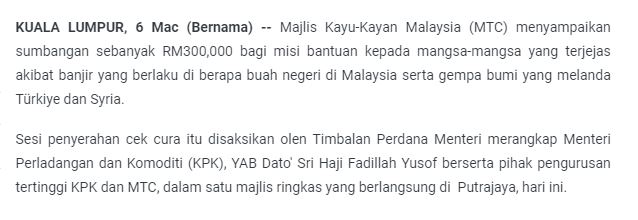In attacking Asian palm oil, the German Government accomplished a key goal (the hypocrisy here is breathtaking): It diverted attention away from its own destruction of peatland and grassland to cornfields / maize for biogas. - NSTP/ABDULLAH YUSOF
LETTERS: Germany recently announced it would phase out palm oil based biofuels in 2023. Environment Minister, Svenja Schulze, justified this decision by indicating "For biofuels to be produced it is not acceptable to cut down woods, to dry up moorland and to destroy nature."
In attacking Asian palm oil, the German Government accomplished a key goal (the hypocrisy here is breathtaking): It diverted attention away from its own destruction of peatland and grassland to cornfields / maize for biogas.
European forest biomass is the dominant fuel source in the EU's Renewable Energy Directive (RED), and Germany generates more energy from biomass than any other country in the EU.
And this is precisely why German lawmakers are criticizing and banning palm oil. It is not credible to imagine Schulze and her colleagues are unaware of this fact: this is all about political expedience.
Even EU Commission Executive Vice-President, Frans Timmermans, knows that without European forests being burnt for renewable energy the EU will not meet its energy targets; he told Euractiv, "Well, without biomass, we're not going to make it."
The decision by the leaders in Berlin signals a willful blindness to environmental facts. The first is that it ignores the dramatic drop in Indonesia's deforestation rate.
Indonesia's deforestation rate is at a near all-time low, with deforestation having fallen by 75 per cent. This has been widely verified by the World Resources Institute and United Nations FAO report on the state of the world's forests, among others.
The second element is its environmental illiteracy: the 'unsustainable' crop being banned is far more efficient, more productive, uses less land, fewer pesticides, than the 'sustainable' oil crops that will be used to replace it, i.e. rapeseed.
Here are some of the data:
1. Oil palm produces 7 times more oil per hectare than rapeseed.
2. Oil palm also requires less fertilizer and pesticide compared to rapeseed and sunflower; and.
3. The Oxford Handbook of Food, Politics, and Society clearly sets out the inefficiency and environmental footprint of rapeseed and sunflower.
Germany's track record of decision-making on energy policy is an abject failure, and is wreaking havoc with German energy markets.
The 'Green' Energiewende policy championed by Chancellor Merkel has led to a huge rise in coal burning and an associated rise in emissions. This is resulting now in acute energy shortages and power plant closures because of disruptions to Germany's coal supply.
Consider also that this has become the norm in Europe: the EU Commission, French Government and Belgian Government all have in recent years chosen political protectionism for their farmers, over science and reason. More land will be used for agriculture, more emissions created.
Underlying all of this is a complete misunderstanding of where Germany's trade and economic future lies.
If you look back at Chancellor Angela Merkel's 16 years in power, she visited palm oil producing countries Malaysia and Indonesia back in 2016, and indicated that Germany had no plan to discriminate against palm oil. There was one simple reason for this: the hope of growing German exports to a fast-growing region with over 250 million consumers.
The Indonesians have been clear about their stance on trade repercussions in response to any discriminatory measures against palm oil, with Indonesian President Jokowi calling the EU's previous actions "acts of trade war." Indonesian MPs called for reciprocal bans following the Belgian decision to ban palm oil biofuels; milk powder from France and alcohol products from across Europe have previously been disrupted during a palm oil dispute.
It is bizarre, in the midst of both a major national election and a post-Covid economic slump, that the decision would be taken to antagonize southeast Asian governments.
All the more so, because Christian Lindner, leader of the Liberal FDP party and the man more than likely to be the next German Finance Minister – has expressly committed to pushing forward a new trade relationship with Asean nations. This palm oil decision makes Lindner's ambition highly unlikely to be achieved.
So: hypocrisy abounds, the science is wrong, the economics are illogical, and an election promise has been cut down before the vote even happened.
https://www.nst.com.my/opinion/letters/2021/10/733833/germanys-move-ban-palm-oil-about-political-expedience
Sumber: New Straits Times







